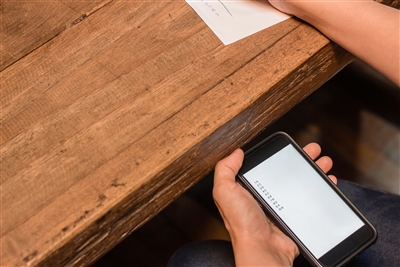Cheating Using Mobile Phones

With so much importance being placed on just a few exams during their teenage years, is it really a surprise that that many pupils decide to try to cheat their way to a higher grade? Ofqual, the exam regulator from England, have just published a report disclosing how the number of pupils involved in `exam malpractice` more than doubled between 2017 and 2017.
The most common form of illicit exam behaviour was smuggling `unauthorised materials` into the venue. This could be small pieces of paper containing relevant information (cheat notes as they were called in my day), but were usually mobile phones or other internet enabled devices. With a store house bigger than the library of Alexandria in a small, easily concealable device, the temptation to sneak a phone into the exam hall must be overwhelming. I suspect that if mobile devices were available when I was a student, may grades would have been far higher. I`m jesting of course - I received top grades in all my exams.
The report made it clear that `In most cases, it was a mobile phone or other electronic communications device,` that led to a student being censured for misconduct. 80% of all cases we down to the use of a phone during an exam, while plagiarism accounts for 17% of misdemeanours.
Ofqual have said that in the majority of cases cheating students were penalised with a reduction in their grade. Exactly how these reductions are calculated hasn`t been disclosed - perhaps the browsing history on the offender`s mobile device is examined, so the extent of their nefarious deeds can be determined.
Even though there has been a 25% rise in the number of offenders caught cheating, the actual proportion of students engaging in this activity is very low. The 2,715 penalties given to 2,585 students make only a mere 0.015% of the 18 million exams sat in 2016 and 2017. The percentage is extremely low - either the students are extremely adept in surreptitiously squirrelling away smart phones about their person, or very little cheating is actually occurring in the exam hall. The latter case seems to me to be the more likely: the stark, fearful environment of the exam hall does not strike me as a place where it would be easy to secretly scour the internet on a small screen. Apparently most exam venues are now decked out with CCTV cameras, so even if your activities escape the notice of the patrolling sentries, marching with slow and steady step down the aisles of desks, you may still come unstuck when footage of your iniquitous deeds are later discovered.
Many exam questions resist being aced by mere google intervention, as they strike a more opinionated tone, rather than a mere factual one. Instead of asking `in what year did Hitler reoccupy the rhineland`, the question might be `in your opinion what were the causes of the second world war?`
A more concerning detail of the Ofqual report is the increase in college and school staff involved in exam malpractice. The numbers increased from 360 during 2016, to 895 in 2017 - a disconcerting rise indeed. Actual details of the misdeeds of the staff is not present in the report, but is likely to include failure to ensure strict conditions are maintained in exam halls. Ofqual said one of the reasons for the increase in staff malpractice is different exam boards, the AQA being one example, have recently taken a tougher position against individual misconduct.
`Exam boards are more likely to issue formal written warnings for similar offences rather than informal advisory notes this year. This still involves a very small proportion of the total number of staff in England,` the exam regulator Ofqual said.
The report offered a more detailed breakdown of the cheating relating to each academic subject: maths and computer science came out on top, together accounting for a third of all cases. In relation to plagiarism, computing GCSE was by far in the lead, hardly surprising given that the assessment tasks for the GCSE exam had been leaked and circulated online. In response to this Ofqual announced that the computing coursework would not count towards the student`s final grade, and this would be the case for future academic years, until significant reforms had been made.

 Add a Comment
Add a Comment